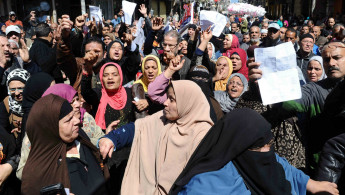Will Egypt's bread riots be met with tank barrels?
Police clashed with protesters in working-class districts of Alexandria, Kafr El Sheikh, Minya and Asyut where demonstrators blocked roads and surrounded government offices chanting: "We want to eat!"
In the aftermath of the protests, Egyptian government fears over potential public disorder following any new bread shortages were manifest as the country's General Authority for Supply Commodities [GASC] said it was attempting to secure larger strategic reserve of wheat.
The decision in March by Egyptian authorities to order bakeries to reduce the sales of subsidised bread loaves was but the latest in a series of highly controversial austerity measures affecting state rations that have struck a raw nerve amongst Egypt's most deprived communities.
Egypt's crisis-ridden economy has been subject to progressive waves of government cut-backs since Egypt secured a 12 billion US dollar loan from the IMF to ostensibly help revive the economy.
Yet Egypt's economic unrest shows no sign of abating with inflation soaring to over 30 percent since November 2016 following a decision by the government to float the country's pound.
Questions are now being raised as to the extent to which Egypt's entire austerity program is being manipulated by the administration to further cement the hold of the private sector and the military on Egypt's economy.
A Foreign Policy analysis has said the Egyptian government is using the IMF loan agreement to "punish the lower classes while maximising its commercial gains".
| Read Also: The economics behind Egypt's political unrest |
"While it enthusiastically reduces subsidies to impoverished civilians, it has expanded its domination of many economic sectors and reaped huge profits at the expense of the private sector," the author writes.
The analysis further argues the military establishment had only selectively implemented loan conditions, which include a top-down strengthening of the private sector, to maximise its own profits.
Reports of escalating dissent and public protest of the austerity measures comes against others that tell of Egypt's military and security establishment reaping significant rewards as a result of the recent policies.
While the overwhelming role of Egypt's army in the country's economy has long been documented, the army is now both ruling the country as well as managing a "business empire".
The analysis further argues the IMF agreement failed to consider the extent to which the military dominate both Egypt's economy and government bureaucracy.
Instead of correctly implementing the agreement, the military sought to protect its own interests at the expense of the poor, it added.
Egyptians have been hit with the worst inflation in a decade, cutting spending as much as possible as prices surge by over 30 percent on basic food items, transport, housing and even some essential medicines.
Nearly half of the country's 92 million-strong population earns below or near the UN poverty line of 1.9 US dollars a day.
The analysis drew significant comparison between March's bread riots and similar riots which occurred in 1977, when hundreds of thousands of working-class people demonstrated against then President Anwar Sadat's policies as the later sought loans from the World Bank.
When the bread riots of 1977 turned violent, Egypt's military quickly sent in army tanks to supress the revolts.
If austerity policies once again trigger unrest in the country, few will expect Egypt's army to act in any other way except to resort to violence to protect its position.



